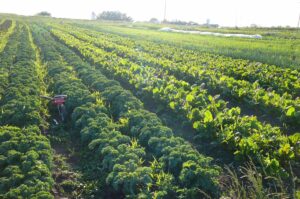Organic farming has garnered significant attention and popularity over the past few decades. This method of agriculture emphasizes the use of natural inputs and processes to grow crops and raise livestock. By avoiding synthetic chemicals and genetically modified organisms (GMOs), organic farming offers numerous benefits that extend beyond the farm itself. This article explores the multifaceted advantages of organic farming, highlighting its positive impacts on health, the environment, and the economy.

1. Health Benefits
One of the primary motivations for both farmers and consumers to embrace organic farming is the array of health benefits it offers.
Reduced Exposure to Pesticides
Organic farming strictly limits the use of synthetic pesticides, herbicides, and fertilizers, which are commonly used in conventional farming. This reduction in chemical usage translates to lower residues in organic produce.
Key Benefits:
- Healthier Produce: Studies have shown that organic fruits and vegetables tend to have lower levels of pesticide residues compared to conventionally grown produce.
- Lower Risk of Health Issues: Exposure to certain pesticides has been linked to health problems such as cancer, hormone disruption, and neurological disorders. By reducing pesticide use, organic farming minimizes these risks for both consumers and farm workers.
Higher Nutrient Content
Organic farming practices often result in produce that is richer in essential nutrients.
Key Benefits:
- Increased Antioxidants: Research indicates that organic crops can have higher levels of antioxidants, which are compounds that protect the body from oxidative stress and inflammation.
- Better Nutritional Profile: Organic produce may contain higher levels of certain vitamins and minerals, contributing to a healthier diet.
2. Environmental Benefits
Organic farming’s commitment to sustainable practices has substantial environmental benefits, helping to preserve natural resources and promote biodiversity.
Soil Health
Healthy soil is the foundation of successful farming, and organic farming places a strong emphasis on maintaining and improving soil quality.
Key Benefits:
- Enhanced Soil Fertility: Organic farming techniques, such as composting, crop rotation, and the use of cover crops, improve soil fertility and structure.
- Reduced Soil Erosion: Practices like no-till farming and maintaining soil cover reduce erosion, preserving the land for future use.
Biodiversity
Organic farms typically foster greater biodiversity than conventional farms, both above and below the soil surface.
Key Benefits:
- Habitat Preservation: By avoiding synthetic chemicals, organic farms provide a safer habitat for wildlife, including beneficial insects, birds, and other organisms.
- Pollinator Protection: Organic farming supports populations of pollinators, such as bees and butterflies, which are crucial for many crops. This helps to maintain the ecological balance and ensures the pollination of various plant species.
Water Conservation
Organic farming practices contribute to better water management and conservation.
Key Benefits:
- Reduced Water Pollution: By eliminating synthetic fertilizers and pesticides, organic farming reduces runoff that can contaminate water sources with harmful chemicals.
- Improved Water Retention: Healthy, organic soils have better water-holding capacity, reducing the need for frequent irrigation and making farms more resilient to drought conditions.
3. Economic Benefits
Organic farming can also yield significant economic benefits for farmers, consumers, and the broader economy.
Market Demand and Premium Prices
The growing consumer demand for organic products translates into economic opportunities for farmers.
Key Benefits:
- Higher Prices: Organic products often command higher prices in the market, providing farmers with better profit margins.
- Growing Market: The organic food market has been expanding steadily, offering farmers a stable and growing market for their products.
Farm Sustainability and Independence
Organic farming can enhance the long-term sustainability and independence of farming operations.
Key Benefits:
- Reduced Input Costs: While organic farming may require more labor, it reduces dependency on costly synthetic inputs such as fertilizers and pesticides.
- Financial Resilience: By diversifying crops and improving soil health, organic farms can become more resilient to market fluctuations and environmental challenges.
Community and Local Economies
Organic farming often supports local economies and strengthens community ties.
Key Benefits:
- Local Employment: Organic farms tend to employ more labor-intensive practices, creating job opportunities within local communities.
- Local Markets: Organic farmers frequently sell their products locally, supporting local markets and reducing the carbon footprint associated with transportation.
4. Ethical and Social Benefits
Beyond the tangible benefits, organic farming aligns with broader ethical and social values, promoting a more humane and equitable food system.
Animal Welfare
Organic farming standards typically include stringent animal welfare requirements.
Key Benefits:
- Better Living Conditions: Organic livestock must have access to outdoor spaces and be raised in more humane conditions compared to conventional farming practices.
- Natural Behaviors: Animals on organic farms are often allowed to exhibit natural behaviors, contributing to their overall well-being.
Consumer Trust and Transparency
Organic certification provides consumers with a trusted standard for sustainable and ethical farming practices.
Key Benefits:
- Certified Practices: Organic certification requires adherence to specific standards, providing transparency and building consumer trust.
- Informed Choices: Consumers who choose organic products can feel confident that they are supporting sustainable and humane farming practices.
Conclusion
Organic farming offers a holistic approach to agriculture that benefits health, the environment, the economy, and society. By prioritizing natural processes and sustainable practices, organic farming not only produces healthier food but also contributes to the preservation of natural resources and the promotion of biodiversity. Economically, it provides farmers with opportunities to tap into a growing market and achieve better financial sustainability. Ethically, it supports animal welfare and consumer trust. As the global population continues to grow and environmental challenges intensify, organic farming presents a viable and beneficial alternative to conventional agricultural practices, fostering a healthier and more sustainable future for all.










